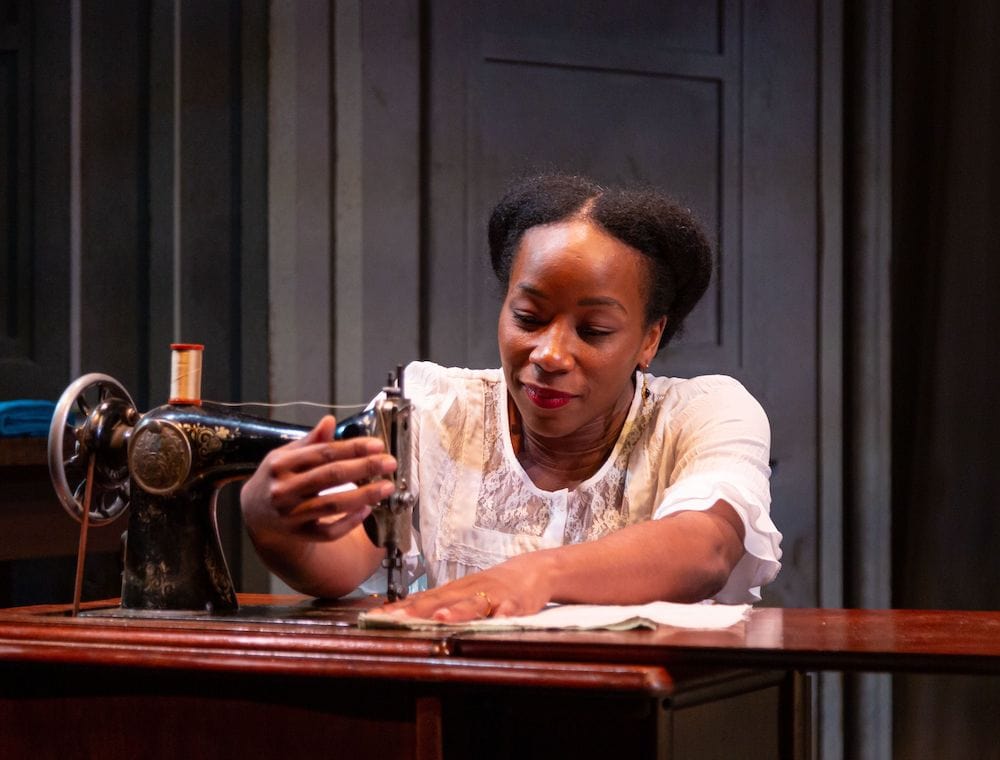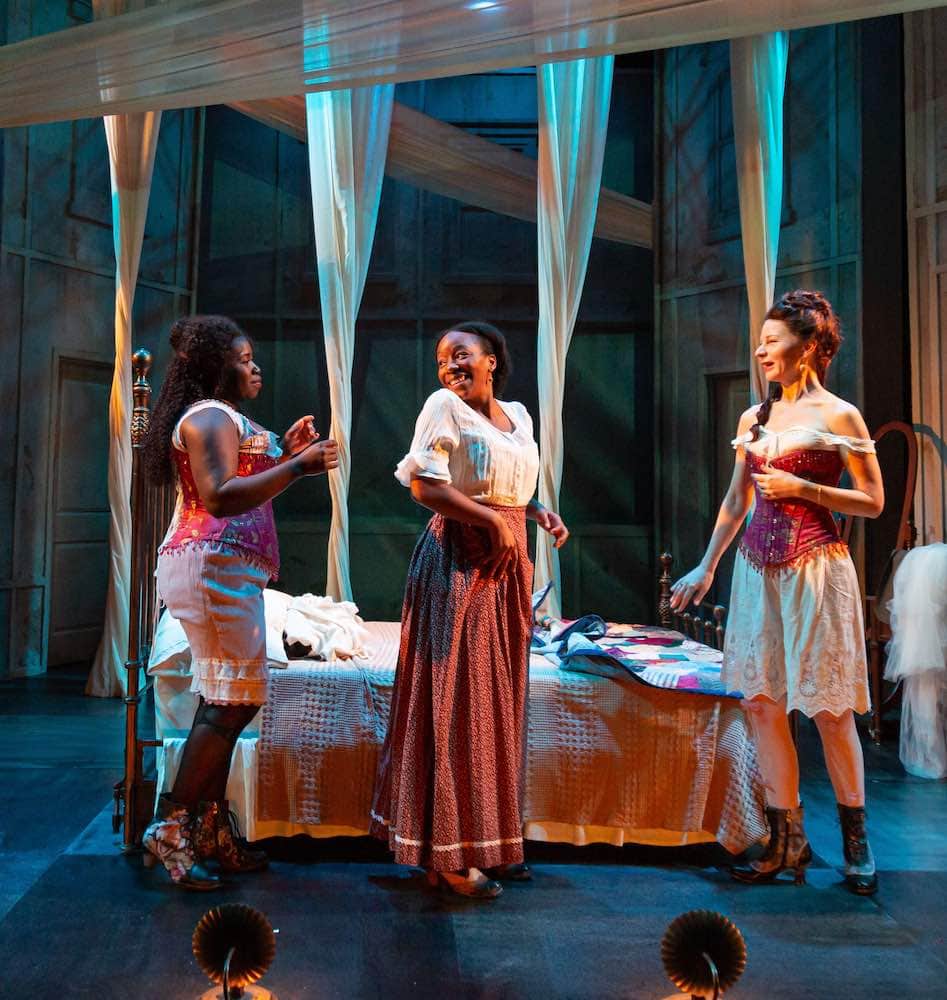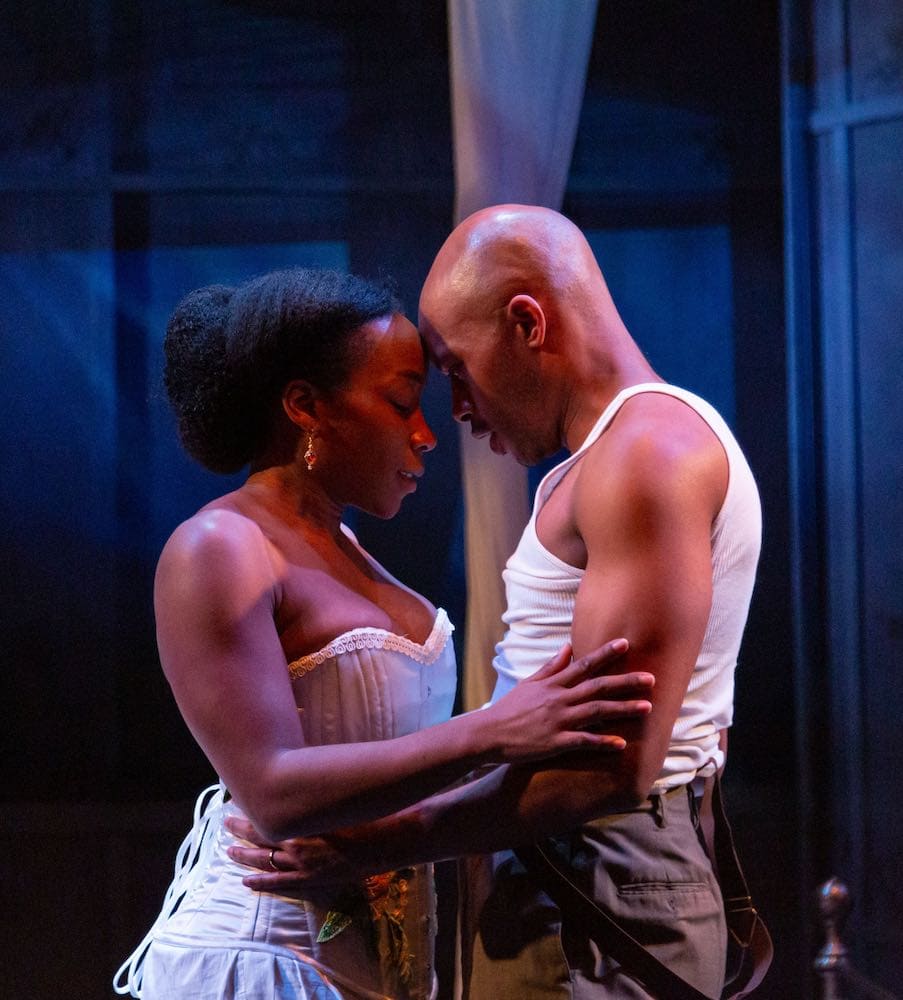Among playwright Lynn Nottage’s exemplary qualities is the ability to draw sympathetic characters with an eye to the social conditions that shape them, even in the worst ways. In Intimate Apparel, now playing at Theatre J under the direction of Paige Hernandez, this facility is brought to bear on the story of a Black seamstress in early-20th-century New York City, whose aspirations and troubles are stitched into her work. Her journey through the play is bound to not only the garments she crafts but the achingly private moments that call for them, all of which are finely realized in this production.

Esther (Renee Elizabeth Wilson) is an expert seamstress working in the room she rents from the widow Mrs. Dickson (Aakhu TuahNera Freeman). Her garments are prized by the likes of both Mrs. Van Buren (Susan Lynskey), a high-society white woman, and Mayme (Awa Sal Secka), a Black prostitute and aspiring showgirl. It also pulls her into the orbit of men shifted by the global tides of migration: Mr. Marks (Yoni Bronstein), a Romanian immigrant and fabric merchant, and George (Manu Kumasi), an ambitious Caribbean laborer working away at the Panama Canal. Esther works her way through a steady if unsatisfying life, her eyes always on a beauty parlor she plans to open with her savings, until things start to change when George starts writing her letters that grow steadily more romantic. Esther’s illiteracy forces her to seek help from her clients, who craft equally longing responses on her behalf. Despite Mrs. Dickson’s concerns and the warm but suppressed attentions of Mr. Marks, Esther welcomes George’s subsequent marriage proposal sight unseen. Sadly, Esther’s longing for intimacy puts her dreams at risk and pulls at the threads of her relationships, revealing the economic factors that complicate and corrupt even the most well-meaning people.
That the play is dominated by private, sensuous encounters—some erotic, some friendly, others ostensibly professional—is evident before a word is spoken. Paige Hathaway’s set, fitted ever so snugly into the Edlavitch DC Jewish Community Center’s narrow proscenium stage, is dominated by a brass bed. Hernandez stages the most pivotal scenes in orbit around its frame, trending closer to its center as Esther’s entanglements deepen. A tall, three-part sheer curtain and two diagonal shafts of sheer fabric highlight Esther’s craft and the tantalizing visions her apparel is meant to evoke. George speaks his first few letters from behind the curtain, teasing the audience just as he teases Esther. The diagonal stretches of fabric make useful screens for Projection Designer Zavier Augustus Lee Taylor, who beams onto them the titles of each scene, all of which correspond to the central fabric or garment of the moment. Taylor’s projections also suggest subtle changes in location—large fronds for Panama, hedges for New York.

Naturally, Mayenda Kulemeka’s costumes serve an especially vital function. Esther’s long skirt highlights her modesty in comparison with Mrs. Van Buren and Mayme, who are comfortable in their corsets and stockings. George begins the play as an undershirt-clad archetype of the romantic laborer and ends in a suit of fine Scottish wool made by his new wife; it marks his change in status, which corresponds to a change in attitude. Mr. Marks’ distinctive, all-black Hasidic attire is suitably untouchable save till the end, when he savors a luxurious garment that looks amusingly, and endearingly, flashy on him. The creative team clearly relishes Nottage’s meditation on the reciprocal relationship between human beings and their clothes.
Like Kulemeka’s costumes, the cast successfully traces the outlines of Nottage’s characters. Wilson carries the show comfortably as humble Esther, though she is at her most engaging when flashing a wide, giddy grin that evokes Esther’s childlike innocence. Lynskey’s breathy Mrs. Van Buren and Freeman’s regal, if somewhat unsteady, Mrs. Dickson offer contrasting visions of women, one white and one Black, ensconced in the positions afforded them by marriage. Kumasi’s George is all romantic posturing at the beginning, all bug-eyed intensity and insolence at the end. The standouts are Bronstein and Secka, both of whom nicely articulate their character’s contradictions. Bronstein, genially soft-spoken but always clear, finds the tension between Mr. Marks’ piety and his carnal desire; Secka’s Mayme cycles from deliberately cheeky to self-consciously showy, a steely core beaming through her glittery exterior.

Where Theater J’s rendition excels is in staging the intimacy foregrounded in the title. While the Edlavitch’s small stage cramps a few of the production’s tableaus, Hernandez’s expertise in composition, aided by intimacy coordinator Cliff Williams III, shines through. Esther’s forbidden touch of Mr. Marx’s black coat is staged with enough emphasis to be clear but not melodramatic. When Esther’s relationship with Mrs. Van Buren crumbles under the weight of segregation and Mrs. Van Buren’s privileged obliviousness, it is a pained silence that sustains, not histrionics. The bed remains the centerpiece throughout, harboring Esther and Mayme as they conspire to woo George, then blocking Esther from her husband as the edges of their marriage begin to fray.

Altogether, it is the craft and care in pivotal moments that will reward audiences and further Theater J’s emphasis to tell increasingly diverse, complex stories that touch on the Jewish experience. From the program notes to the composition, Intimate Apparel promises an evening that is moving, insightful, and tailored to the play’s strengths.
Running Time: Two hours 20 minutes, including one 15-minute intermission.
Intimate Apparel plays through November 13, 2022, presented by Theater J at the Aaron & Cecile Goldman Theater in the Edlavitch DC Jewish Community Center, 1529 16th Street NW, Washington, DC. Purchase tickets ($44–$85) online or by calling the ticket office at 202-777-3210.
The program for Intimate Apparel is online here.
COVID Safety: All patrons in the Goldman Theater are required to wear masks covering their nose and mouth. Only performers and guests invited onstage may be unmasked. Masks are optional but encouraged in the Q Street and 16th Street lobbies, hallways, and other public spaces. For more information, visit Theater J’s COVID Safety Guidelines.




